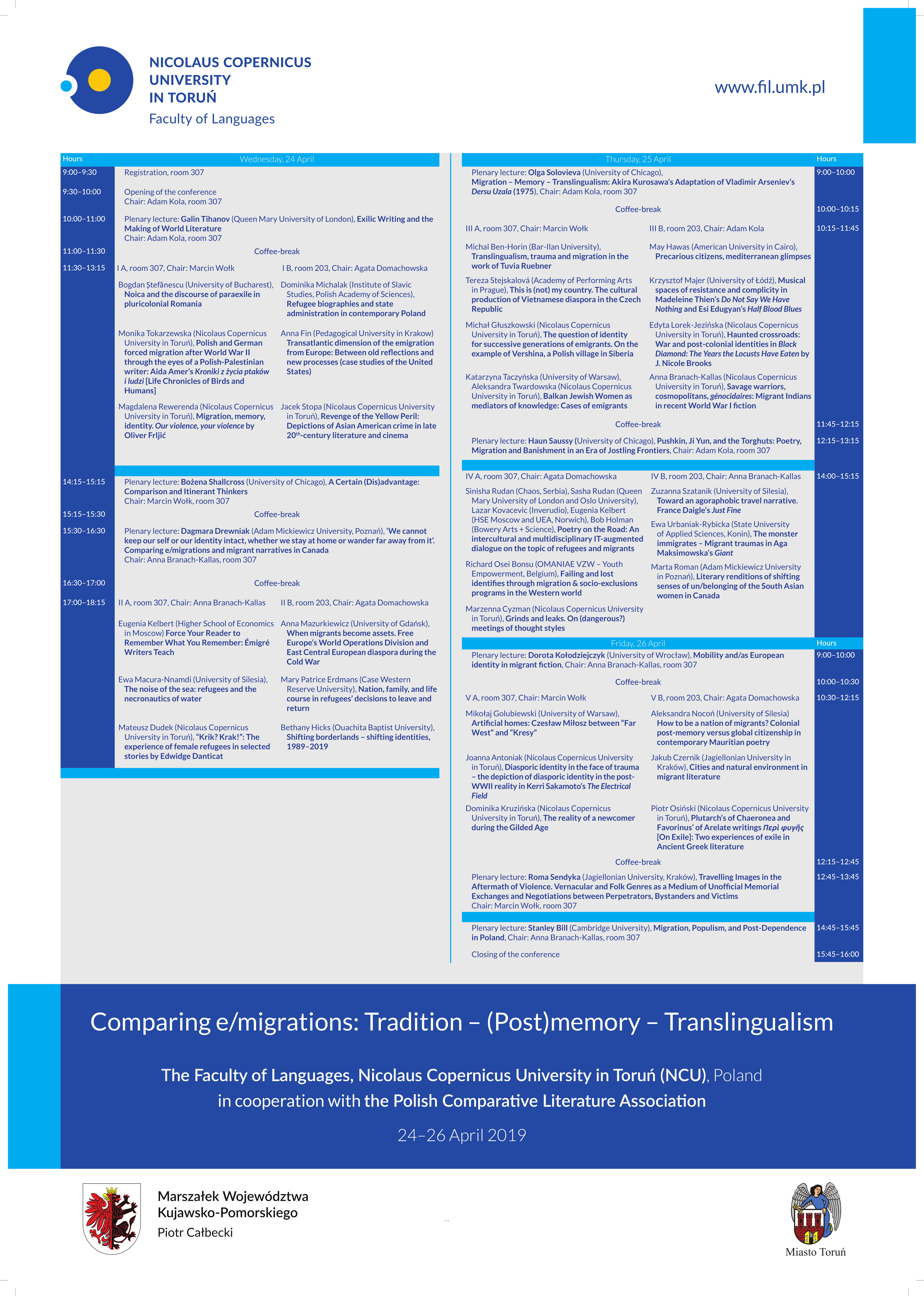XX-LECIE WYDZIAŁU
Comparing e/migrations: Tradition – (Post)memory – Translingualism
Faculty of Languages
Nicolaus Copernicus University in Toruń (NCU)
Poland in cooperation with the Polish Comparative Literature Association
April 24-26, 2019, Toruń, Poland
The conference was held in Toruń, Poland to celebrate the 20th anniversary of the Faculty of Languages at the Nicolaus Copernicus University in Toruń.
Confirmed keynotes and invited speakers:
- Galin Tihanov, Queen Mary University of London,
- Bożena Shallcross, University of Chicago,
- Dagmara Drewniak, Adam Mickiewicz University, Poznań,
- Olga Solovieva, University of Chicago,
- Haun Saussy, University Professor at the University of Chicago,
- Dorota Kołodziejczyk, University of Wrocław,
- Stanley Bill, Cambridge University.
Conference Programme/Program konferencji
The current migrant crisis has recently become one of the most significant topics of political and public debate not only in Europe but, in different forms and on a different scale, all over the world. Border barriers (fences and walls) and sinking asylum seekers’ boats, human trafficking and smuggling are among the most visible signs of contemporary violence. There is no doubt that the refugee crisis has reached global proportions and represents one of the most serious challenges of late modernity. However, widely understood migration – its different forms and practices, causes and objectives – is as old as humankind.
The main topic of our interest at this conference was e/migrations as an object of comparative studies within different traditions, schools, and approaches, as well as migrations as a comparative and comparatists’ experience. We sought the answer to the following questions: What is the relevance of earlier theoretical concepts and approaches, such as postcolonialism and decoloniality, roots and routes, diasporic, cosmopolitan and transnational identities in the 21st century? How does migration change our thinking about home, belonging, language and self in an age of globalization but also defensive fundamentalism and conservative backlash? What is the effect of analysing migratory itineraries in a comparative framework? How do migrations reconfigure our understanding of the legacies of violence?
We hope that the conference has opened up a discussion on new forms and new understandings of e/migrations and migrant experience; it will also enable us to face emerging questions about the place of migrants, immigrants, emigrants, refugees, asylum seekers, and displaced persons in the contemporary world and beyond. The delegates were interested in all topics and problems related to e/migration in the context of cultural production: literature, film, music, and all other forms of artistic production. They considered both linear narratives of migration and more experimental ways of representing migration traumas and crises.
We welcomed almost 40 scholars from different fields of the humanities and social sciences who shared their ideas on the following topics:
- The history and tradition of e/migrations;
- Post/memory of e/migrations, of the first, second and third generations of migrants;
- The representation of diasporas and diasporic identities today; gender and sexuality in the context of migration and diasporic experience;
- The problem of translingualism as a challenge to national (literary) canon formation;
- Cosmopolitanism, global citizenship, statelessness and expatriatism;
- Migrations hubs and non-places as cultural intersections on travel routes;
- Capitalist expansion, labour migrations (both forced and voluntary) and the post/colonial condition;
- Migrations genres and artistic manifestations;
- Traveling theories and theorists;
- Nature and landscape, climate migrations, environmental refugees;
- Migrations and violence (changing borders, wars, population transfers or resettlements, deportation and ethnic cleansing).

Social events included:
- a guided tour of the Old Town and The Olender Ethnographic Park (recreating the lives of the 17th-century settlers from the Netherlands and Friesland, members of the Protestant Mennonite group),
- a visit to an exhibition of Marina Abramović’s art, entitled DO CZYSTA/THE CLEANER, at the Centre of Contemporary Art ZNAKI CZASU (the artist’s biggest retrospective in Europe organised together with the Moderna Museet in Stockholm, in collaboration with the Louisiana Museum of Modern Art in Humlebaek and the Bundeskunsthalle in Bonn).
Organizing committee:
- NCU Prof., dr hab. Anna Branach-Kallas, Department of English, Faculty of Languages NCU, President of the Polish Association for Canadian Studies,
- Dr. Agata Domachowska, Department of Balkan Studies, Faculty of Languages, NCU,
- Dr. Adam Kola, POSTCOMER – Laboratory for the Study of Collective Memory in Post-Communist Europe, Deputy Dean of the Faculty of Languages, NCU, President of the Polish Comparative Literature Association,
- Dr hab. Marcin Wołk, Institute of Polish Literature, Laboratory for Comparative Literary and Cultural Studies, Faculty of Languages, NCU.

 Fosa Staromiejska 3, 87-100 Toruń
Fosa Staromiejska 3, 87-100 Toruń